An interview with Frank Dolwick
Interview
I grew up on a farm in Kentucky and ended up going to college and Dental School at the University of Kentucky. I started there in 1967. I became really interested in Oral Surgery, in my junior year in dental school. My whole senior year I spent doing oral surgery and taking some courses in Anatomy. My main advisor was Raymond White, he was chairman of Oral Surgery at a very young age. Then, talking with him about the career, I decided to follow his career path. He had a PhD in Anatomy and did Oral Surgery.
Authors: Frank Dolwick,

The evolution of a scientific journal is intrinsically linked to the quality of its articles, editorial rigor and, above all, the active engagement of the scientific community that supports it. JBCOMS (Journal of the Brazilian College of Oral and Maxillofacial Surgery) is at a decisive moment in its trajectory, directing institutional and technical efforts to meet the criteria for indexing in prestigious databases such as LILACS and SciELO. This movement not only aims to increase the...
Read more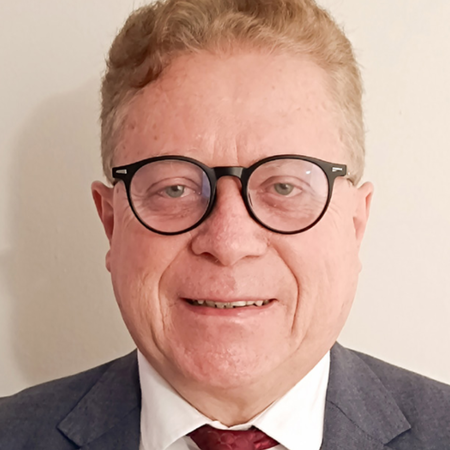
Dear members, colleagues and readers, it is with great satisfaction that we address the dental community and Brazilian society to reaffirm our commitment to the appreciation, qualification and strengthening of Oral and Maxillofacial Surgery and Traumatology throughout the country. We are living in a crucial moment for our specialty. Oral and Maxillofacial Surgery, recognized by the Federal Council of Dentistry (Brazilian CFO) and supported by guidelines from the Ministry of Education and the...
Read more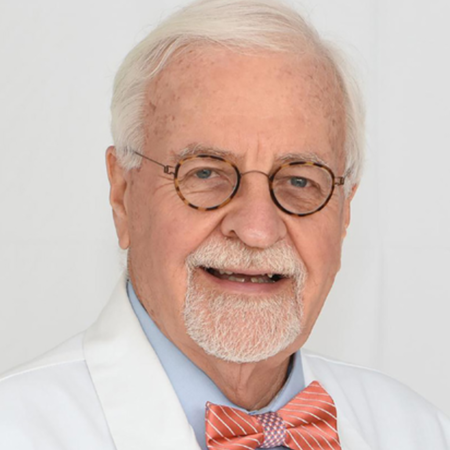
I grew up on a farm in Kentucky and ended up going to college and Dental School at the University of Kentucky. I started there in 1967. I became really interested in Oral Surgery, in my junior year in dental school. My whole senior year I spent doing oral surgery and taking some courses in Anatomy. My main advisor was Raymond White, he was chairman of Oral Surgery at a very young age. Then, talking with him about the career, I decided to follow his career path. He had a PhD in Anatomy and did...
Read more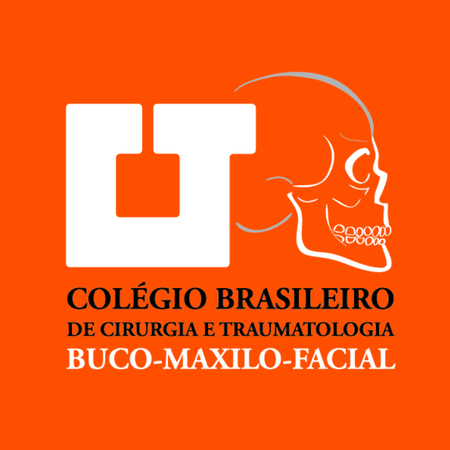
Introduction: Glucagon-like peptide-1 receptor agonists (GLP-1RAs) have emerged as an advancement in the treatment of type 2 diabetes. While these medications offer benefits, they also present potential complications in surgeries. A primary concern is the delayed gastric emptying induced by GLP- 1RAs, which can increase the risk of aspiration during anesthesia. Objective: To assess the awareness and understanding among oral and maxillofacial surgeons, a nationwide survey was conducted. Results:...
Read more
Introduction: Extraction is an essential procedure in Dentistry, used to remove compromised teeth and maintain oral health. Objective: This retrospective study, using descriptive statistical analysis, aimed to investigate the demographic, clinical and epidemiological profile of extractions carried out at the university dental clinic at Unicesumar in Londrina/PR (Brazil) from 2022 to 2024, in addition to assessing possible postoperative complications and their relationship with various...
Read more
Introduction: There has been continuous controversy regarding Centric Relation (CR) definition over the years. Objective: As it is essential for oral rehabilitation and orthognathic surgery, this study aimed to evaluate whether there is a consensus among oral and maxillofacial surgeons, orthodontists, and prosthodontists regarding the definition of CR, Centric Occlusion (CO) and Retruded Contact (RC). Methods: An electronic questionnaire was sent to groups of these three specialties,...
Read more
Introduction: Oral and Maxillofacial Surgery (OMFS) is a regulated specialty responsible for diagnosing and treating complex conditions affecting the masticatory system and craniofacial structures. In Brazil, OMFS training is provided through specialization courses and residency programs, which differ significantly in workload and clinical exposure. The lack of standardization in training programs may impact professional competence and influence the incidence of legal disputes. Methodology:...
Read more
Introduction: Temporomandibular disorders (TMD) have a variable distribution in the population, with specific clinical factors that can increase susceptibility to the disease. Objective: The objective of this study was to investigate the epidemiological profile of individuals with articular TMD and possible risk factors, in addition to evaluating complaints, final diagnosis and treatment of choice. Methods: An observational, transversal and retrospective study was carried out, with 100...
Read more
Introduction: Langerhans cell histiocytosis (LCH) is characterized by the infiltration and proliferation of dendritic cells, characterized by normal Langerhans cells. LCH has a widely variable clinical presentation, from a single, mildly aggressive lesion to a multisystemic disease. It is a rare disease, with an incidence of approximately 1 in 2 million individuals, which mainly affects young adults. In general, conservative treatment has good prognosis; however, specific cases may require...
Read more
Introduction: Central giant cell lesion (CGCL), also known as central giant cell granuloma, is a benign intraosseous lesion composed of fibrous tissue, multiple hemorrhagic foci, aggregates of multinucleated cells and, occasionally, bone trabeculae. CGCL can be classified into aggressive and non-aggressive variants, depending on its location, symptoms and rate of progression. Objective: The objective of this article was to report the clinical cases of three patients diagnosed with CGCL, treated...
Read more
Introduction: Cleft lip and palate (CLP) are common malformations affecting function and aesthetics, with late-onset fistulas arising in bone grafts. Objective: This study aimed to review the challenges and therapeutic options for these fistulas, by means of a case report. Case report: A 65-year-old female patient with a history of CLP and multiple surgeries sought treatment for a persistent fistula. Surgery was performed to remove the fistula and close it with a myomucosal flap, followed by...
Read more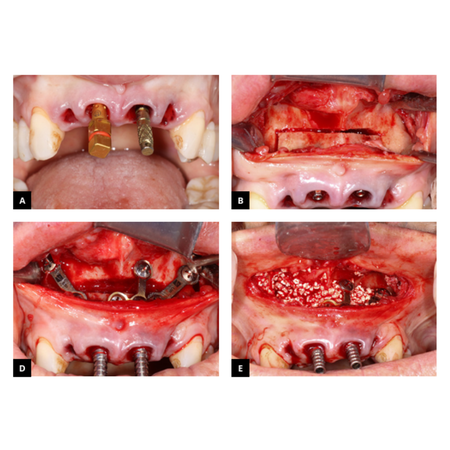
Introduction: Implant-supported rehabilitation of cases with decreased anterior vertical dimension of the maxilla is a challenge, requiring unconventional techniques. Objective: The aim of this article is to report a clinical case of implant-supported rehabilitation after anterior segmental osteotomy of the maxilla (ASOM). Case report: A 53-year-old female patient with periodontal disease sought care with aesthetic and functional complaints. The upper incisors were extracted, implants were...
Read more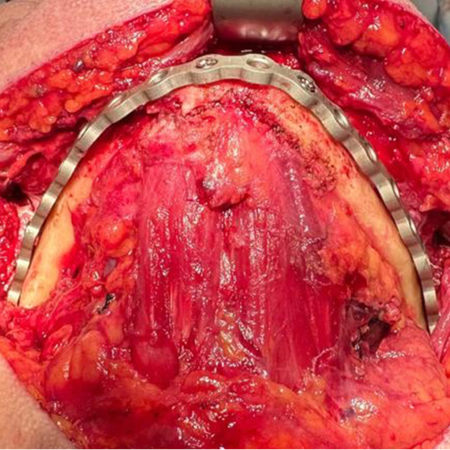
Introduction: The placement of dental implants in atrophic mandibles carries significant risks, particularly the possibility of bone fractures due to altered biomechanics. Objective: This case report describes the clinical and surgical management of an elderly patient with a comminuted atrophic mandibular fracture following implant placement. Case report: A 74-year-old male patient presented to the hospital emergency room with severe pain and malocclusion after the placement of four implants...
Read moreCopyright © 1998 - 20225 | All rights reserved. is a Dental Press brand